Welcome to an exploration of the life and legacy of Abraham Lincoln, the 16th president of the United States. In this reading activity, we’ll discover Lincoln’s remarkable journey from humble beginnings to becoming one of the most revered figures in American history.

From his pivotal role in leading the nation through the Civil War to his enduring impact on issues such as slavery and national unity, Lincoln’s legacy continues to resonate today.
Text: The life and legacy of Abraham Lincoln
Abraham Lincoln, the 16th President of the United States, is renowned for his leadership during the American Civil War and his efforts to abolish slavery. Born on February 12, 1809, in a log cabin in Hardin County, Kentucky, Lincoln’s early life was marked by hardship and limited formal education. Despite these challenges, he developed a passion for reading and self-education, which laid the foundation for his future career in law and politics.
Lincoln’s political career began in the Illinois state legislature and continued with a term in the U.S. House of Representatives. His debates with Senator Stephen A. Douglas during the 1858 Illinois Senate race brought him national attention, particularly for his eloquent arguments against the expansion of slavery. Although he lost that Senate race, his performances positioned him as a prominent figure within the newly formed Republican Party.
In 1860, Lincoln was elected President of the United States. His election prompted the secession of several Southern states, leading to the outbreak of the Civil War in 1861. Lincoln’s leadership was crucial during this tumultuous period. He faced immense pressure from various factions within the Union but remained steadfast in his commitment to preserving the nation and ending slavery.
One of Lincoln’s most significant achievements was the issuance of the Emancipation Proclamation on January 1, 1863, which declared all slaves in Confederate-held territory free. This pivotal move altered the character of the war and paved the way for the eventual abolition of slavery. In 1865, Lincoln was instrumental in the passage of the 13th Amendment, which permanently outlawed slavery in the United States.
Tragically, Lincoln’s life was cut short on April 14, 1865, when he was assassinated by John Wilkes Booth at Ford’s Theatre in Washington, D.C. His death came just days after the Union’s victory in the Civil War, plunging the nation into mourning.
Lincoln’s legacy endures as a symbol of integrity, perseverance, and moral leadership. His vision of a united nation and his dedication to justice and equality have left an indelible mark on American history, inspiring generations to uphold the principles of liberty and democracy.
Comprehension questions:
Congratulations on completing the exploration of Abraham Lincoln’s life and legacy! By examining his leadership during one of the most challenging periods in American history, we gain insight into the values and ideals that continue to shape the nation today. Remember to reflect on Lincoln’s enduring legacy and his contributions to the pursuit of a more perfect union.



